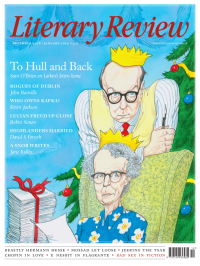Richard Canning
Thrust into the Limelight
All That Heaven Allows: A Biography of Rock Hudson
By Mark Griffin
HarperCollins 469pp £20
It’s thirty-three years since Rock Hudson became the first American celebrity to admit that he was dying as a result of AIDS. Yet until now we haven’t had a major account of Hudson’s complex career and still more complicated private life to displace – or even question – the star’s hastily conceived memoir, Rock Hudson: His Story, published posthumously in 1986. It’s also half a century since the self-identifying gentle giant’s celluloid career dried up: his last important role was in Ice Station Zebra (1968). True, Hudson migrated to television and constantly sought out more work, including on stage. But it’s a lonely critic who finds anything but the faintest echoes of his big-screen greatness in McMillan & Wife (1971–7), let alone in the tragic appearances Hudson made in Dynasty in his last year.
There were gaping holes in Hudson’s own version of events. That considered, it might also be remembered that, as a supposedly closeted gay man ravaged by AIDS, Hudson was scarcely alone in the mid-1980s in not dwelling on the years of hedonism that then seemed to have led to this horrific end. Hudson surprised almost nobody in finally ‘coming out’ (in a fashion) as gay. But the way in which Hudson – unlike so many gay celebrities anticipating an AIDS-related death, from the French philosopher Michel Foucault to the American pianist Liberace – in July 1985 in Paris admitted that he was seeking treatment for AIDS-related conditions was highly significant and also very moving.
Not long before, Hudson had characteristically supported his close friend Doris Day’s latest career revival, Doris Day’s Best Friends, by appearing on television visiting her Californian ranch. The gaunt actor struck the television audience as unrecognisable; rumours took flight. Hudson’s admission – after allowing his US publicist to

Sign Up to our newsletter
Receive free articles, highlights from the archive, news, details of prizes, and much more.@Lit_Review
Follow Literary Review on Twitter
Twitter Feed
How to ruin a film - a short guide by @TWHodgkinson:
Thomas W Hodgkinson - There Was No Sorcerer
Thomas W Hodgkinson: There Was No Sorcerer - Box Office Poison: Hollywood’s Story in a Century of Flops by Tim Robey
literaryreview.co.uk
How to ruin a film - a short guide by @TWHodgkinson:
Thomas W Hodgkinson - There Was No Sorcerer
Thomas W Hodgkinson: There Was No Sorcerer - Box Office Poison: Hollywood’s Story in a Century of Flops by Tim Robey
literaryreview.co.uk
Give the gift that lasts all year with a subscription to Literary Review. Save up to 35% on the cover price when you visit us at https://literaryreview.co.uk/subscribe and enter the code 'XMAS24'